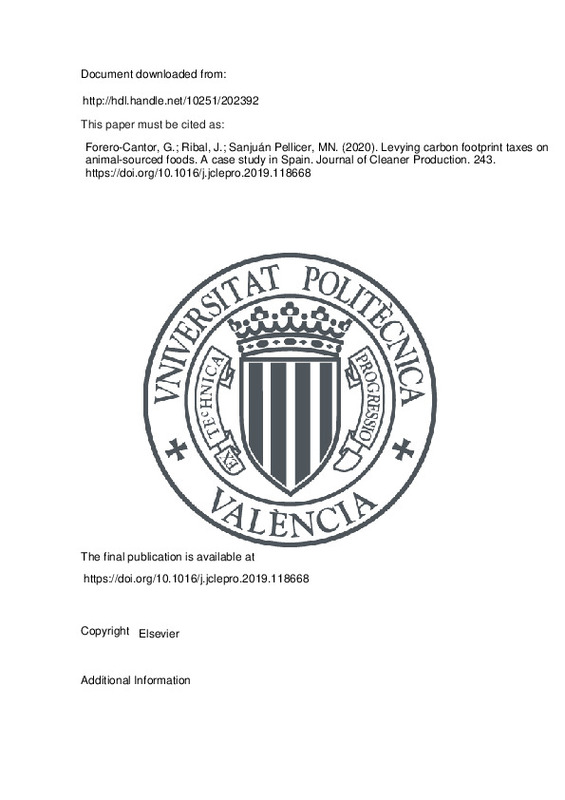JavaScript is disabled for your browser. Some features of this site may not work without it.
Buscar en RiuNet
Listar
Mi cuenta
Estadísticas
Ayuda RiuNet
Admin. UPV
Levying carbon footprint taxes on animal-sourced foods. A case study in Spain
Mostrar el registro sencillo del ítem
Ficheros en el ítem
| dc.contributor.author | Forero-Cantor, G
|
es_ES |
| dc.contributor.author | Ribal, Javier
|
es_ES |
| dc.contributor.author | Sanjuán Pellicer, María Nieves
|
es_ES |
| dc.date.accessioned | 2024-02-07T19:01:58Z | |
| dc.date.available | 2024-02-07T19:01:58Z | |
| dc.date.issued | 2020-01-10 | es_ES |
| dc.identifier.issn | 0959-6526 | es_ES |
| dc.identifier.uri | http://hdl.handle.net/10251/202392 | |
| dc.description.abstract | [EN] The consumption of some kinds of meat contributes significantly to global warming. Hence, dietary changes towards a decreased consumption of these products might lead to reductions in greenhouse gas emissions. Information campaigns can induce a reduction in meat consumption, but they need time since meat is deeply rooted in our diets. Instruments based on changing prices, such as the levying of taxes, stand out as an effective option. This study aims to estimate the greenhouse gas mitigation potential of implementing consumption taxes on some protein-rich foods in Spain. Data from the Spanish panel of household food consumption for the period 2004-2015 and literature data on the carbon footprint of animal sourced foods were used. An almost ideal demand system with the moving blocks bootstrap method was applied to estimate the elasticities and calculate the consequences for the carbon footprint associated with the consumption of seven animal-sourced foods. The results show that taxes on fish can be the most effective at reducing the total carbon footprint and those applied on pork are the least. The results also suggest that high tax rates on the most polluting products do not always lead to the greatest carbon footprint reduction. Further research should incorporate combinations of taxes on different products together with an analysis of potential regressive effects on other socio-economic issues. However, reducing meat GHG emissions is a global challenge which requires inter-disciplinary collaboration together with political actions. | es_ES |
| dc.description.sponsorship | Research funded by the doctoral scholarship program sponsored by the Universidad del Tolima (Colombia). | es_ES |
| dc.language | Inglés | es_ES |
| dc.publisher | Elsevier | es_ES |
| dc.relation.ispartof | Journal of Cleaner Production | es_ES |
| dc.rights | Reconocimiento - No comercial - Sin obra derivada (by-nc-nd) | es_ES |
| dc.subject | Life cycle assessment | es_ES |
| dc.subject | Greenhouse gas emissions | es_ES |
| dc.subject | Carbon based food tax | es_ES |
| dc.subject | Meat consumption | es_ES |
| dc.subject | Sustainability | es_ES |
| dc.subject.classification | TECNOLOGIA DE ALIMENTOS | es_ES |
| dc.subject.classification | ECONOMIA, SOCIOLOGIA Y POLITICA AGRARIA | es_ES |
| dc.title | Levying carbon footprint taxes on animal-sourced foods. A case study in Spain | es_ES |
| dc.type | Artículo | es_ES |
| dc.identifier.doi | 10.1016/j.jclepro.2019.118668 | es_ES |
| dc.rights.accessRights | Abierto | es_ES |
| dc.contributor.affiliation | Universitat Politècnica de València. Facultad de Administración y Dirección de Empresas - Facultat d'Administració i Direcció d'Empreses | es_ES |
| dc.contributor.affiliation | Universitat Politècnica de València. Escuela Técnica Superior de Ingeniería Agronómica y del Medio Natural - Escola Tècnica Superior d'Enginyeria Agronòmica i del Medi Natural | es_ES |
| dc.description.bibliographicCitation | Forero-Cantor, G.; Ribal, J.; Sanjuán Pellicer, MN. (2020). Levying carbon footprint taxes on animal-sourced foods. A case study in Spain. Journal of Cleaner Production. 243. https://doi.org/10.1016/j.jclepro.2019.118668 | es_ES |
| dc.description.accrualMethod | S | es_ES |
| dc.relation.publisherversion | https://doi.org/10.1016/j.jclepro.2019.118668 | es_ES |
| dc.type.version | info:eu-repo/semantics/publishedVersion | es_ES |
| dc.description.volume | 243 | es_ES |
| dc.relation.pasarela | S\401249 | es_ES |
| dc.contributor.funder | Universidad del Tolima | es_ES |







![[Cerrado]](/themes/UPV/images/candado.png)

